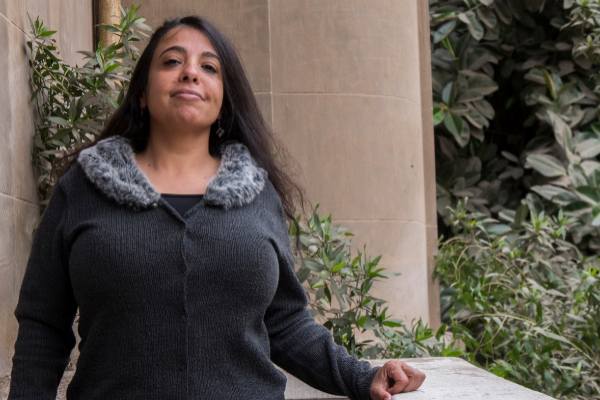- Egypt, grieving for Coptic Christians
When his father passed away a year ago, Hoda Nasrala came face to face with an unexpected reality: despite belonging to the Egyptian Christian minority, he had to submit to the precepts of "sharia" (Islamic legislation) and -according to his dictates- receive half of the inheritance that his brothers brothers . "It all started with the document that is essential to present to proceed with the distribution of inheritance and the distribution of property and money," says this human rights lawyer from her office, on a cold winter morning in Cairo. "At the time of proceeding to the procedure, I requested that the distribution of the inheritance be equal with the placet of my brothers and in accordance with an article of the Egyptian Constitution, which recognizes that these matters must be regulated according to the provisions of the religious community to the to belong, "he recalls.
The response to his efforts, however, was resounding. "The authorities considered that the 'sharia' should be applied and then dismissed my request," says this 40-year-old lawyer. Far from resigning himself, Hoda then opened a legal dispute that - three judges later - has just concluded in his favor, in a historic decision. "I am happy. This ruling opens the way for other Christians," he admits. Dozens of compatriots await a similar verdict in court. Since the convulsive 1950s, when the army overthrew the monarchy and established a regime still in force, the Christian minority - which accounts for around 8% percent of the 100 million Egyptians - has resolved the transmission of family inheritances under of the precepts of the majority creed. "In the 40s of the last century, laws were created that regulated inheritance rights for non-Muslim communities because it was a time when the country had a foreign population, Christian and Jewish, very important. All that was lost a decade later, "confesses Hoda.
Christian parishioners from the land of the pharaohs, who mostly follow the Coptic Orthodox Church, tried to embrace unity by renouncing egalitarian inheritance . "There was a pressure for the Coptic community to emphasize their belonging to the national identity of Egypt. That pressure moved to the commitment to the general rule regulating inheritances, derived from Islamic legislation. The opposite would have been observed as an attempt to differentiate, "says the protagonist of a legal triumph that now confirms the right of Christians to share the assets of their parents according to their own rules. "What happened for a long time is that the division stipulated by the 'sharia' was accepted and then privately brothers and sisters shared property and property equally, outside the law," evokes Hoda.
A habit that time, however, began to erode. "The Coptic community began to face another challenge. The male members of some families wanted to safeguard that privilege and began to reject informal practices that guaranteed equality until then. They simply claimed that it was the money that the State gave them and what it established. the legislation, "denounces the lawyer who did not give up her efforts despite the refusal she had when she moved her lawsuit to an appeal court. "The first ruling rejected my request and ratified the application of the 'sharia', which meant that my two brothers would inherit twice as much as I did. We again appealed the decision and a second magistrate understood my request and determined that by agreeing all family members, the Christian standard could be applied . "
"The Church should bet on equal inheritance"
His firm victory has been applauded by the state media, to the surprise of the litigant. "It has had a very positive echo in the press despite the fact that it is a very controversial judicial decision. The main message has been that this is a strictly Christian demand. The good thing is its effect on the law of personal status that is discussed. for years in the Christian communities. The churches, from the Coptic to the Protestant, should not now be afraid of betting on the egalitarian heritage, "the lawyer advances.
Al Azhar, the Islamic institution based in Cairo, does not object. "Egyptian and Islamic laws do not prevent the application of other jurisprudence for non-Muslim communities but with certain conditions, among them, that all the beneficiaries of that heritage belong to the same creed," Faqih Mohamed, professor of Islamic Jurisprudence, replies to this newspaper. at the University of Al Azhar. "On this particular issue, Christians ended up subject to Islamic law because the advice of notables was canceled and membership in different Christian branches forced them to abide by the general law that is the 'sharia'," argues the academic, who does not question the resolution adopted in the Hoda litigation.
However, getting Muslims to receive the same heritage as their male brothers still seems like a utopia. "I do not think they can get it at this time. In Egypt, that debate arose when an egalitarian law was discussed in Tunisia in 2018. Then it became clear that there was great resistance, starting with Al Azhar. Many Muslims have been fighting this battle for years but it is an even more complicated struggle than ours as Christians, "concludes Hoda.
According to the criteria of The Trust Project
Know more- Egypt
Stories How the youth of Egypt passed the street protests to the revolution of the startups
Social networks "Don't try to say no": the wild macho song that triumphs in Egypt
EconomyThe Valencian Community adheres to the UN pact for sustainable tourism

